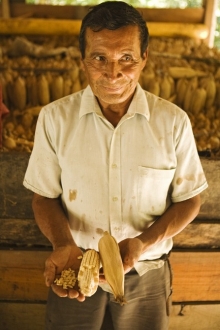Contemporary forest gardens are found scattered throughout the Maya world, providing an important source of traditional botanical knowledge. The idea of a forest garden encompasses a variety of disciplines including archaeology, agroecology, agroforestry, agriculture, ethnobotany, and community development. The El Pilar Program has been active in recreating the Maya forest garden at the Tzunu'un house site at El Pilar. The El Pilar Program has also helped establish an educational forest garden at the village primary school in Santa Familia which has been named Känan K’aax, meaning “well cared-for forest” in Mayan. These forest gardens reproduce an aspect of ancient Maya life and encourage the expansion of this system in practical use today.
The program recognizes the importance of the Maya forest garden based on extensive archaeological research of household and settlement data in the Maya region as well as study of contemporary Maya forest garden practices. The data points to a continuum of resource management strategies from intensive polycultivation systems within densely settled communities, such as El Pilar, to extensive, scattered fields in sparsely settled areas.

